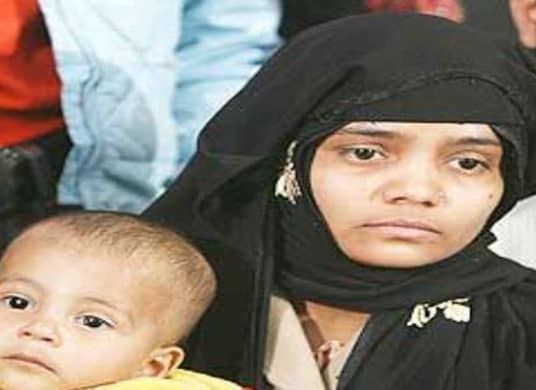Three of the 11 convicts in the Bilkis Bano case have approached the Supreme Court, seeking an extension of time to surrender before the jail authorities.
Senior Advocate V Chitambaresh, appearing for the three convicts, mentioned the matter before a bench headed by Justice BV Nagarathna, seeking urgent listing of the case, saying the time of surrender is expiring on January 21.
Justice Nagarathna said that the bench that passed the judgement in the Bilkis Bano case, comprising herself and Justice Ujjal Bhuyan, has to hear the applications.
The apex court then directed its Registry to seek orders from the Chief Justice of India for the constitution of the bench and listing of the case on Friday.
Another counsel told the bench that another convict would also file applications during the day.
The applications have been filed by three convicts–Govindbhai Nai, Mitesh Chimanlal Bhatt, and Ramesh Rupabhai Chandana–who, among others, were granted remission by the Gujarat government in the gangrape of Bilkis Bano and the murder of her family members during the 2002 Godhra riots.
They were sentenced to life imprisonment but released in August 2022 after serving 14 years of sentence.
Govindbhai has sought an extension of time by four weeks to surrender, citing health issues and the fact that he is the only caretaker of his elderly parents.
Ramesh Rupabhai Chandana sought an extension of six weeks, citing health issues, harvesting of crops and his son’s marriage.
Mitesh Chimanlal Bhatt, 62, says he is an old senior citizen, has undergone eye surgery for a cataract and sought six weeks to surrender due to the impending harvest of crops.
On January 8, the Supreme Court struck down the Gujarat government’s order granting remission to 11 convicts.
It had quashed the Gujarat government’s remission order, by which convicts were released pre-maturely, and asked them to surrender before jail authorities within two weeks.
The bench had held that the Gujarat government was not competent to pass the remission orders but the Maharashtra government.
It held that the judgement of May 13, 2022, by which another bench of the apex court had directed the Gujarat government to consider remission of the convict as per the 1992 policy, was obtained by “playing fraud” on the court and by suppressing material facts.
The convicts had not approached the court with clean hands, said the bench, adding that proceedings before this court were due to “suppression of facts” and that is why it is fraud played on this court.
The judgement of the top court had come on a petition filed by Bilkis Bano and others challenging the premature release of 11 convicts.
Earlier, the Gujarat government, in its affidavit, defended the remission granted to convicts, saying they had completed a 14-year sentence in prison and their “behaviour was found to be good.”
In March 2002, during the post-Godhra riots, Bano was allegedly gang-raped and left to die with 14 members of her family, including her three-year-old daughter. She was five months pregnant when rioters attacked her family in Vadodara. (ANI)
For more details visit us: https://lokmarg.com/


